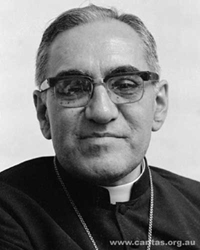
The 2010 Romero Days, a series of events commemorating the 30th anniversary of the assassination of Salvadoran Archbishop Oscar Romero will be held at the University of Notre Dame March 24 to 26 (Wednesday to Friday).
Bishop Alvaro Ramazzini of San Marcos, Guatemala, will speak on the state of civil and human rights in his diocese on March 24 at 12:30 p.m. in Room 1130 of the Eck Hall of Law. An internationally recognized human rights activist, Bishop Ramazzini has been an outspoken and frequently threatened advocate for the campesinos, immigrants and landless people of Guatemala. Also on March 24, he will preside and preach at Mass in the Basilica of the Sacred Heart at 5:15 p.m.
Ana Carrigan, journalist and author of the recent book “The Palace of Justice: A Colombian Tragedy,” will speak on her work and on social conditions in Colombia March 25 at 12:30 p.m. in the auditorium of the Hesburgh Center for International Studies.
Also on March 25, a new documentary film, “Monseñor: The Last Journey of Oscar Romero,” will be shown at 8 p.m. in the Browning Cinema of the DeBartolo Performing Arts Center. The film includes extracts from Archbishop Romero’s Sunday homilies and from his personal diary, and personal interviews of a cross section of Salvadorans: campesinos, guerrillas, soldiers, politicians, priests, nuns and catechists. Rev. Robert Pelton, C.S.C., director of Notre Dame’s Latin American/North American Church Concerns (LANACC) will travel to El Salvador to introduce the film at its world premiere in the Cathedral of San Salvador on March 19.
Archbishop Oscar Romero was assassinated by a right-wing death squad while presiding at Mass on March 24, 1980, in a hospital in San Salvador. His outspoken advocacy of human rights, his denunciations of U.S. military aid to El Salvador, his call for Salvadoran military personnel to disobey immoral orders, and his insistence that the Church be inseparable from the poor all made him a figure of some controversy before and after his death.
Archbishop Romero has been officially recommended for canonization by the Catholic Church in El Salvador, and he already is widely venerated as a martyr in his native country, throughout Latin America and in the United States.
Romero Days is organized annually by LANACC, which seeks to interpret Latin American Catholicism to U.S. Catholics and others through films, publications and public events.
The events of the 2010 Romero Days are co-sponsored by LANACC and Notre Dame’s Kellogg Institute for International Studies, the Latin American Studies Program, the Bishop Shaheen Leadership Fund, the Center for Civil and Human Rights, the Center for Social Concerns, the Department of Theology, the Institute for Church Life, the Kroc Institute for International Peace Studies, Campus Ministry, the Institute for Latino Studies, and the Department of Film, Television and Theatre.
More information on the 2010 Romero Days is available here.
Contact: Rev. Robert Pelton, C.S.C., 574-631-8528 or rpelton@nd.edu; or Therese Hanlon, events coordinator, Kellogg Institute, 574-631-4150, Therese.Hanlon@nd.edu